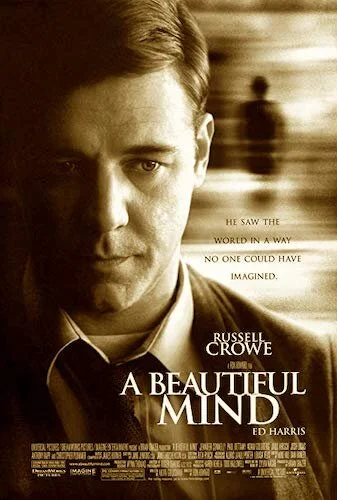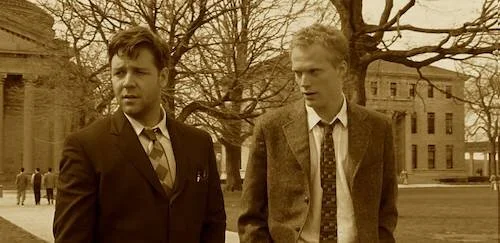A Beautiful Mind
This review is a part of the Best Picture Project: a review of every single Academy Award winner for the Best Picture category. A Beautiful Mind is the seventy fourth Best Picture winner at the 2001 Academy Awards.
Look. I know I shouldn’t like this film as much as I do, because of all of its fabrications. Yet, is it okay for The Social Network to get by being a different message conveyed by real people and events? If so, why is that not the case with A Beautiful Mind? So Ron Howard and Akiva Goldsman completely make up the symptoms of John Nash’s various illnesses; these were meant to translate these traits better on screen. Yeah, A Beautiful Mind is centred more around Nash’s marriage with Alicia, even though many factual obstructions were left out (John’s infidelities, for starters). We know John Nash was not perfect, and A Beautiful Mind really doesn’t get into his many morally distraught problems. If I was reviewing the accuracy of a biopic, A Beautiful Mind would likely be a 0.5 out of 50. That’s not what I’m doing. I’m reviewing a film. Each time I revisit A Beautiful Mind, I feel more confident in my fondness of the picture, and all of its plethora of lies.
Removing the film from the highly complicated life of John Nash, we have a more basic tale of a mathematical genius fighting for the approval of… well, himself. He never goes to any of his Princeton classes, and he only betters himself to make sure his mind is intact (he also doesn’t mind being better than his scholarship partner Martin, too). He only has one friend in Charles (his roommate), but he eventually — and quickly — falls in love with Alicia: a student of his. Eighteen years later, I think most of us know the real purpose of the film. If not, I won’t discuss this pivot too greatly.
John Nash with his roommate Charles, on Princeton grounds.
In short, I will say that A Beautiful Mind does a great job at representing a brain betraying itself. It goes beyond what John Nash is capable of with his level of intellect. We all have brains (shocking, I know). Even the more average minded of us may experience this organ that we heavily rely on decaying. Howard is a heavy handed filmmaker, who definitely follows in the footsteps of Steven Spielberg, so A Beautiful Mind is naturally sappy. For me, it just works. I can’t explain why, but it works. Maybe it’s the tribulations of a workaholic, fending for his own sanity, making a monumental breakthrough for the world to see. Perhaps it’s these personal battles, projected or real, that clash together and become the ultimate test for a man creating his own turmoil without realizing it. It could just be sad to see a gift with its problems, knowing that John will either live a plagued genius, or render himself a wasted, average minded citizen. It’s a devastating choice to make for someone so blessed with intelligence.
A Beautiful Mind does its bait-and-switch at the perfect time. The entire film doesn’t go to waste, rather the second and third acts become a recuperation process. You can call act one a waste of time. I see it as the introduction to John Nash’s daily occurrences from his perspective. With the slow build between John and his loved ones, it’s tragic to see some of the most important people in John’s life just fade away. James Horner’s exquisite score captures the convergence of technicality and organic make up. These melodies either flurry with notes, replicating a mind percolating with thought, or they represent the heart, overflowing with untapped emotion. All things considered, Horner’s score would be in my top 100 films scores of all time, as it moves me within microseconds. At the heart of the film is a career-best performance by Russell Crowe as John, who stares off into a distance but is always on track with where he is going with his discoveries. When his downfalls begin, he begins to feel lost, and it turns the rest of his surroundings into a small jail cell trapping him. Jennifer Connelly’s emotional reasoning (as Alicia Nash) encapsulates the film’s frustrations or empathy perfectly; her emotional foil to John’s mental whirlwinds become a tether point for us to cling to.
Alicia consoling her husband, trying to help him understand his predicament.
I almost considered A Beautiful Mind a guilty pleasure for over ten years. It’s incredibly cheesy, entirely conventional, and it drifts way too far away from its arguably more interesting source material. Does that have to make me dislike a film, though, if the end result works on me? When I say works on me, I’m going to have to make a confession. A Beautiful Mind gets to me too well. I find myself drowning in my own tears by the end of this film, and I hated that it connects with me this much. I hated it, because it did exactly what it strived to do, and it did so with means I usually don’t condone. Sometimes, the obvious course of action is the right course of action. I don’t see myself claiming A Beautiful Mind is a misunderstood masterpiece, but, dammit, I’m going to use the internet to proclaim once and for all that I like this film. I really like it. As embarrassing as that may be. I don’t care anymore. Seeing a gift turn into a curse that endangers everyone (John included) is so saddening. Seeing the final act, where everything comes full circle, is the final straw. It’s overwhelmingly beautiful for a film this schlocky.
2015 was a tragic year in relation to this film. John and Alicia both died in a taxicab accident, on the way home after a trip to Norway, where John was awarded the Abel Prize for his groundbreaking mathematics. This was in May. In June, James Horner died after his private Short Tucano plane crash landed in a forest near California. This sick serendipity that claimed the lives of three notable figures was enough to render A Beautiful Mind into a whole new capsule. It now feels like the vessel that houses an innovative mathematician (John), a major advocate for the proper treatment of mental illnesses (Alicia), and a pivotal composer at the turn of the new millennium (Horner). Even though the real story is so much more nuanced and complicated, it’s at this point that I’m fine with this safe, neutralized departure from the actual truth. If the end result is this stunning, who cares? At least this way, A Beautiful Mind is now a place to embrace all three for a little while (and until the end of time in cinema). The film is far from perfect, but I can’t deny how much it heals my heart and soul anymore. There are enough reviews that drive the obvious points across. Let this one share how it can wring you on an emotional level
Andreas Babiolakis has a Masters degree in Film and Photography Preservation and Collections Management from Ryerson University, as well as a Bachelors degree in Cinema Studies from York University. His favourite times of year are the Criterion Collection flash sales and the annual Toronto International Film Festival.






